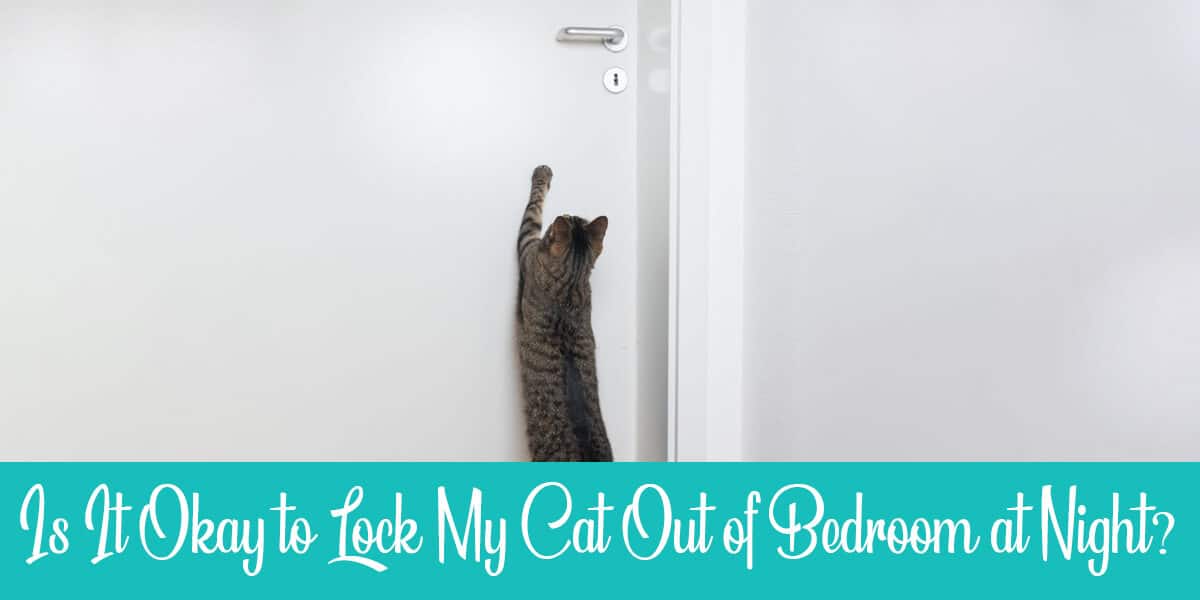Believe me, I understand how heartbreaking those loud meows, clawing, and beating on the door can be. It’s one of those moments when I wonder if I’m being unkind to my furry friend.
Felines do enjoy sleeping and resting in hidden areas of the house. But there’s more to it than that; cats, particularly kittens, can be quite playful and energetic. They sometimes let off steam by going a little crazy and bouncing all over the place.
Now don’t get me wrong, we love how energetic our furballs can be since it’s good for them. That is until we need to sleep. Locking your cat out of the bedroom at night seems to be the reasonable solution. Yet, we can’t always get rid of the guilt that comes with it.
Table of Contents
Locking Cat Out of Bedroom at Night. Is It Wrong?
Nope, it’s totally fine as long as you provide her with a safe and comfortable environment on the other side of the door. Felines are crepuscular animals. Meaning they’re most active in the early evening and early morning hours. So it’s understandable if you keep your kitten locked outside your room to get a good night’s sleep.
Why Do Cats Hate Nighttime Separation?
They’re somewhat disappointed because when they become active and ready to run around, they find you settling down to sleep. They also might have separation anxiety.
Besides, felines aren’t big fans of closed doors. This is because of their territorial nature. They like to feel in control, so closing one door can undermine that. This is why they’ll scratch it or throw their bodies against it to open it.
Signs of Separation Anxiety in Cats

Cats are often misunderstood. Many people believe that they prefer their personal space and don’t form strong bonds with their owners.
But cat owners are well aware that this isn’t the case. The truth is, every feline has a unique personality. Some cats do prefer living on their own and are content with being alone for long periods.
While others may show symptoms of separation anxiety, some of those symptoms are meowing loudly and continuously, crying, irregular eating, urinating/pooping outside the litter box, and excessive self-grooming.
Users Also Read: black spots on cat’s tongue, should I worry?
What Causes Separation Anxiety in Cats?
You’ll start connecting the dots once you learn more about the factors that cause it. Their genetics and environment play a significant role in forming this condition. Some of these factors are:
- Bottle-fed and orphaned kittens.
- The absence of other pets in the house.
- Kittens that have always been indoors.
- Also, this condition is more common in Siamese and Burmese cats, as well as high-strung cats.
Changes in routine can also be a trigger to your furry bud’s separation anxiety. Cats, after all, are creatures of habit; they feel more secure when they stick to a routine. That’s why they don’t handle changes very well.
How to Handle Separation Anxiety in Cats?
First of all, a visit to your veterinarian is a must. Kittens can also act out when they’re ill.
But if your veterinarian has ruled out any medical issues, the best solution is to completely turn a blind eye to your furry friend at night. They will become familiar with the routine over time. And signs of separation anxiety will gradually fade.
How to Get Your Cat Prepped for Nighttime Separation?
For starters, you must build a cozy atmosphere for your furball to ensure that she enjoys her time alone on the other side of the door.
And it’s just as important to start preparing your furball as it is to set up a safe environment for her alone at night. If your cat used to sleep next to you at night, she might act out in protest of this sudden change. And, of course, separation anxiety is another possibility.
That’s why creating a new routine with your furry friend will help with that. So I’ll share some insights and pointers with you below to get you started and help you through this transition.
Must Read:
– Are Yankee candles safe for cats?
– Horned cat paws: do they hurt cats?
Steps to Creating a Comfy Environment for Your Cat
- Provide a nice, soft bed with some of their favorite toys, allow easy access to food and water, and keep the litter box clean.
- Lighting also plays an important role. Felines can’t see in absolute darkness. They enjoy the darkness, but when left alone in it, they might become anxious. So make sure there’s some dim lighting somewhere.
- If your kitten is used to sleeping next to you, it’s a good idea to put a blanket or anything with your scent in it on their bed. This will make them feel safer.
- You could also turn on a relaxing channel on the radio or television at a low volume.
Ways to Make Your Cat Feel Better Before You Sleep
- Wear your kitty out before bedtime. Play with her as much as possible so she can release some of that pent-up energy.
- Make it a positive experience. When your kitten is locked out, she may perceive it as a punishment. You can change that by giving her treats or soothing scratches before you leave.
- Stick to the routine. You mustn’t interrupt it by allowing your cat into your bedroom one night and locking her out the next. If you keep breaking the routine, it’s going to be a waste of time for you and a lot of confusion for your kitty.
It’s best to start familiarizing kittens with this routine at a young age. Older cats may take a little longer to adjust to new routines.
How Would Separating From My Cat at Night Help?
This does help with reducing their separation anxiety as you’re gradually developing your cat’s independence by leaving her alone at night. Now they’ll be less stressed being alone if you have a one-day emergency, a weekend getaway, or are working during the day.
In Conclusion
Try to put all emotions aside when locking your cat out of the bedroom at night. You’re not a bad parent. Felines are masters at capturing our attention. If they’re not suffering from any health problems, then it’s probably their separation anxiety or attitude kicking in.
It’s a good thing, though, that kittens adapt to new routines; it may take some time, but they’ll get there. The essential thing is that you don’t give in and stick to the new routine. Instead, trust the process and always remember that this is to help with reducing their stress when left alone. Whether at night or on other occasions.
If you’re a parent to a clingy furball, I wish you luck in implementing this new routine and, most importantly, a good night’s sleep!

I’ve been living with cats since 2008 and I can confidently say I have more feline friends than humans lol. I currently live with 5 cats in different life stages; two of them are less than one year old, one is 2-ish years old and the oldest two are 9-ish years old. I’ve developed a strong bond with cats over the years and I’m eager to share my experience through this blog. You can learn more about my cats here.


